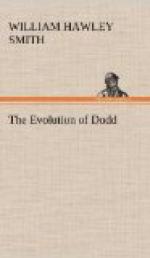But it was “Dodd’s” turn next. Quick as thought he retorted:
“Well, that ain’t half so easy as what the book says.”
The school giggled. Amos lost all control, and, starting toward “Dodd,” he shouted:
“I’ll whip you, you little devil, if it’s the last thing I ever do.”
But “Dodd” was too quick for him. He shot down the room like an arrow, and out at the open door, and was off like a deer. With his club foot, Amos Waughops was no match for the boy with his nimble legs, and, flushed and beaten, the gabbler hobbled back to his desk. He looked toward the twins, all four of them, as if to wreak his vengeance on them, but he somehow felt that they were foemen unworthy of his steel, and forebore.
As for “Dodd,” it was his last day of school with Amos Waughops. Even the persuasion of his grandfather, for whom he had the greatest reverence, was insufficient to get him into the school house again that winter. He learned to do many things on the farm, and helped in out-of-door work in all the coldest days, suffering much from cold and storm, but all this he bore cheerfully rather than meet Amos Waughops and the slat again.
Under these circumstances his parents did not force him to school, and who shall say they did wrong by letting him stay at home and work?
Long suffering reader, you may frown at the introduction of this unfortunate man, Amos Waughops, into the thread of this story, but I can’t help it if you do. I am telling the story of “Dodd” just as it is, and I can’t tell it at all unless I tell it that way. You may not like Mr. Waughops; you may not like his way of teaching school; you may say that I am cruel to harp on facts to the extent of intimating that the mere misfortune of being a cripple is not reason enough for being a school teacher; but I can’t help this either, because it is true, and we all know it is. We lift up our eyes and behold the educational field all white for the harvest and even among the few laborers that are working, we see a large per cent of bungling reapers who trample under foot more grain than they gather, and whose pockets are full of the seeds of tares, which they are sowing gratis for next year’s crop, as they stumble about. I am sure I pity a cripple as much as any one can, but children have rights that even cripples should be made to respect, and no man or woman has a right in the schoolroom merely from the fact of physical inability to work at some more muscular calling. I know there are many most excellent teachers who are bodily maimed, and whose misfortune seems to enhance their devotion to their profession and their success therein, but there are a multitude besides who are in the school room solely because they are the victims of misfortune, and for them there is little excuse to be made. Amos Waughops was a factor in the evolution of “Dodd” Weaver, and his like are found by the quantity in the rural schools of this and other States. We have had enough of them.




